#story: holiest
Text


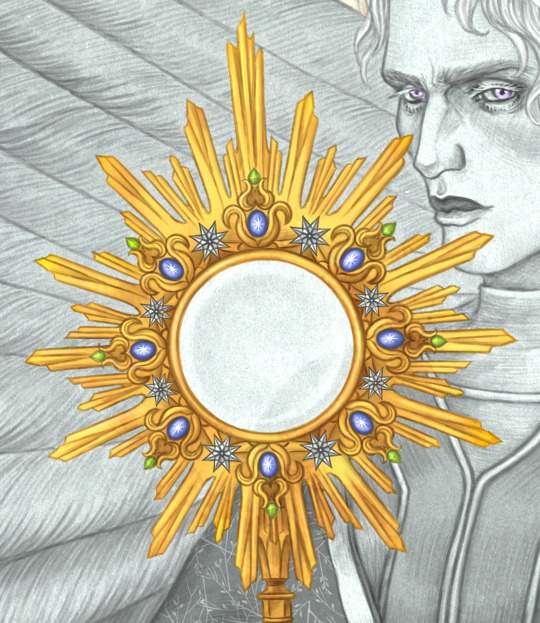
Completed version of Angeltober prompt "Monstrance," featuring my character Metatron. For additional worldbuilding lore regarding this image, please read the [post on instagram]
[patreon] [instagram] [ko-fi]
190 notes
·
View notes
Note
Is the Florence Pugh movie The Wonder? I haven’t seen it but a friend told me about it I remembered it was based on an Emma Donoghue book.
Oh yeah, that’s the title! I do not know why it will not stick in my head, but every time I go to talk about the film I draw a blank
#anyway yes the wonder! a good film#Florence Pugh is great and it’s quite well shot#I read donoghue’s bit of writing about it on her website#and she described how she was interested in the intersection between the idea of the ‘fasting girl’/#& the contemporary phenomenon of the eating disorder particularly in young girls#it’s also just a really interesting story I think about the mixture of holiness and desparation#the premise of the film right is that Florence pughs character is hired to monitor this girl who has supposedly not eaten in 4 months#it’s set in Ireland and donoghue says that she was particularly interested in Ireland as a setting because ‘we have defined ourselves#in relation to hunger’ and I think that that is so striking - yes of course in the wake of a famine the holiest thing is a girl who does#not eat. it is proof that your children will live even past the base necessities of the mortal world#if they’re just holy enough/pious enough etc#and there’s so much more at play! the more I think about it the more I think i should have been more effusive in my praise of it#in the tags of that post#lol anyway having now written an essay…
2 notes
·
View notes
Text
yandere!holy knight with saintess!reader scenario [part one]
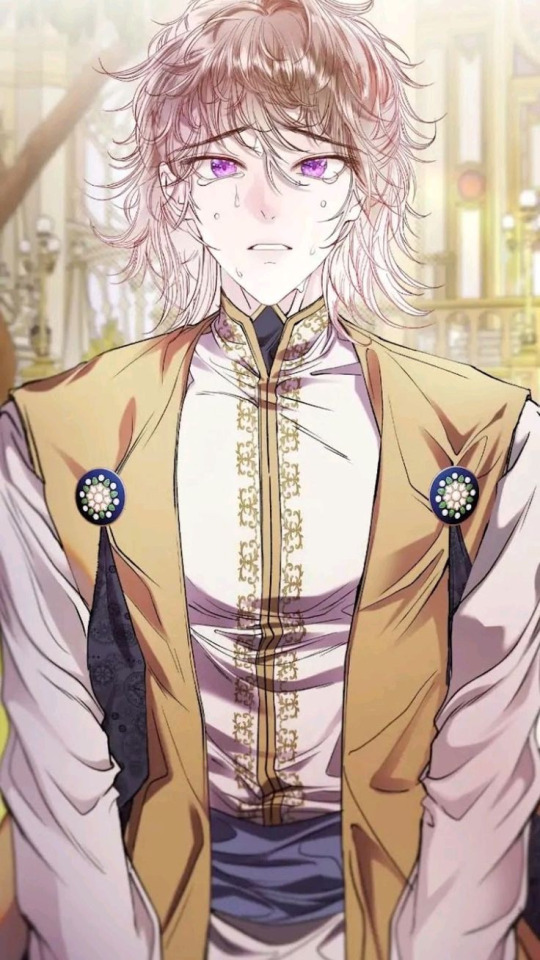
Warnings: obsessive behavior, religious themes, implied manipulation, brief mention of suicidal thoughts/ideation.
There may be possible triggers in this story.
If you do not feel comfortable venturing any further, please hit the 'back' button on your mobile device or computer and read something much more pleasant than a possible series of unfortunate events.
You are responsible for your own
Internet consumption!
MINORS DO NOT INTERACT!
Hey guys, before we get started, I’d like to address a couple of things.
First, the content here is a bit darker than my previous works, as stated in the warnings above. If you or someone you know is struggling, you aren’t alone. There are many support services that are here to help. I will leave a link to some of these sources in this link here. Tumblr also has their messaging system, Kokobot. I want you guys, my audience to feel safe when reading my stories. If you do not feel comfortable venturing any further, that’s okay. Please prioritize your physical and mental health, above all else.
Second, bullying is not tolerated. If I see any sign of it on here, I will have no choice but to take this story down. Finally, there will be some references in here from The Locked Tomb series by Tamsyn Muir, such as Harrowhark and Palamedes. I claim no ownership over this magnificent series as it belongs to the rightful creator.
With that being said guys, sit back, relax....and perhaps begin to pray for salvation. Because this is past the point of no return :)
Part Two
Part Three
Yandere!Holy Knight had always believed he was meant to serve a greater purpose. Not to accumulate wealth and power like his older brother, only to abuse his authority and hurt people who did not deserve a whipping for a cup of tea that was two degrees too cold to his liking. No. He wanted to help others in his own way, without expecting anything in return. Perhaps…that was why it had been so easy to leave his family and find his place here in the Holy Temple of Aesir. Or it was because he is the second son, the spare heir to the Emery viscounty, that his parents allowed him to leave without so much as a second thought.
He had given up his name when he was baptized by the high priest, and was reborn as Sir Palamedes. Five years have passed, and he has ascended to becoming the vice commander of the Holy Temple’s paladins.He must protect the Holy Temple, its clergy, and the people of the Helux Empire. This is the oath he took, and is proud to uphold. Yandere!Holy Knight, however, wished the Reverend Sister would take better care of herself.
The Reverend Sister is a title given to the child chosen by Aesir to deliver His message and protect His children from the wicked monsters who come forth from the swirling, black puddles of miasma. Only the Reverend Sister’s magic can purify the darkness of such an ancient evil. In his mind, there is no one more fitting to being the Reverend Sister than you. Harrowhark.
God’s Beloved.
The Possessor of Aesir’ All Seeing Eyes.
The Holiest Woman in the World.
There are many monikers tied to you. All of them are true, and all of the rumors couldn’t be further from the truth when the bards sang songs of your innocence, your enchanting beauty and ‘swan like neck’. If you had ever heard these lyrics, you would promptly take off your shoe and throw it at them with a low, irritated hiss before stomping away in a huff.
Yandere!Holy Knight would probably try very hard to not laugh at seeing, or at least imagining, your annoyance.
Yes, you were the Reverend Sister but you were not a naive beauty as everyone believed you to be. You were grumpy, diligent, kind-hearted, and knew the world can be a dark, cruel place.
The Holy Temple of Aesir had saved you in your darkest hour; instead of throwing yourself into the cold, murky river as a means to escape from the wretched place you had come from, a low-ranking priest had found you. He took you in, taught you everything there is to know about prayer, penitence, and how to embrace the worst part of yourself even when you wanted to so badly rip it out because it is still part of you. What you had experienced, the hardships, the sorrows…that is life. And to understand that no mortal is perfect, to accept it and use the gifts Aesir had bestowed upon you to help others…that is when you will truly see how beautiful the world is through His Eyes.
His Eyes that you now possessed.
No one had dared to look upon them in fear of incurring Aesir’s wrath…yet Yandere!Holy Knight did when he was in the Holy Temple’s care for a year before you arrived, a young man at the age of fifteen. He saw them and thought they looked like a pair of jewels. Sapphires that glowed brightly under the sunlight, and could see everything. Past, present, and future for a brief time. Due to the physical and mental strain that these Eyes have placed on your body even when it was to create illusions or obscure the sight of magical beasts, you weren’t allowed to overuse them. That was why the High Priest insisted that you wore a veil over your face.
You opted to have the seamstress to make adjustments to your mother-of-pearl robes and add a hood to hide yourself from the world. You might have also bribed her to create a matching cloth to wear over your eyes, enchanted so that you could see through it without putting further strain on your vision.
Rebellious. But you were perfect in Yandere!Holy Knight’s eyes. A Reverend Sister who cared for the congregation, the people, and his men far more than she lets others believe.
He thought this peaceful life would continue as it had for the last ten years. To watch you from afar and know that you were safe so long as he still held a sword in his hands. But nothing lasts forever.
One day, the High Priest had cloistered the clergy in the temple’s pews and announced that Aesir had shown him in a vision that the Reverend Sister who had been with them for these past ten years was not the true child of the Creator. It is in fact the young lady standing at his side. A dainty, beautiful lady with pale blue hair that fell past her back, gentle robin’s egg eyes darting from the carpeted floor to the clergy and then to the High Priest. She wore a strapless white dress with matching gloves that stretched all the way to her elbows. Pear-shaped dangled from her ears, and black lace with a single blue rose attached to the side coiled around her swanlike throat.This stranger, this…noblewoman, is all but ready to accept her duties. From this moment forward, she would be known as Esther.
“Let it be known, Brothers and Sisters, that the one known as Harrowhark shall be sent into exile for her sins against Aesir. That is the will of the Creator, so let it be so.”
Yandere!Holy Knight’s heart plummeted into the pit of his stomach at the High Priest’s words. What? He thought. This cannot be true! You are the Reverend Sister, you are God’s Beloved! Why would this man (this fool a nasty voice in the back of his mind growled) deny it now? Ten years. For ten long years, you have been a faithful bride of the Holy Temple. Now, after everything you have down, the recklessness in trying to sacrifice your life for his men on missions, reaching out to the people and listening to them confess their sins in the prayer box because you did not wish to see them suffer and try to offer guidance without overstepping your boundaries….you would just be cast aside as if you were nothing to them? To the Holy Temple, to him?
No. Yandere!Holy Knight cannot and will not accept it. He knows the High Priest. He knows this man would never dare to do something so stupid lest he will incite the anger of the clergy, the people, and the Emperor himself, who is a religious man and knows the Reverend Sister.
Something is not right.
He was not the only one who believed it. You did too. You had told him as much later that night, when you found him at the training grounds, trying to relieve his anger by practicing his swings with his two-handed longsword. You were still here. You hadn’t left like the High Priest had ordered you to do so. Thank Aesir.
If he were a lesser man, he would have scooped you up in his arms and laughed joyously, waking up everyone else in the barracks and gotten smacked across the face for pushing past your five-foot rule. But he didn’t.
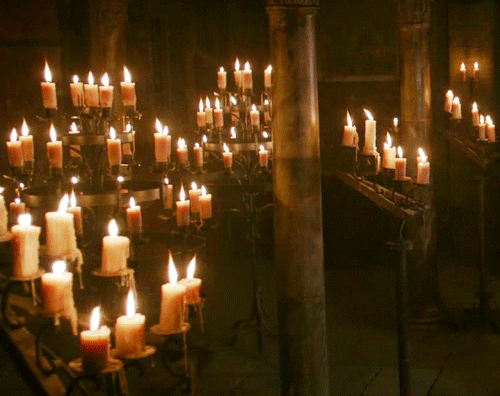
You had not been blessed with His Eyes just to pretend that you will unconditionally obey the High Priest’s request to leave and be branded a heretic, a false Reverend Sister, for the rest of your life. No. The woman who will be baptized as Reverend Sister Esther and become God’s Beloved is not who the High Priest believes she is, regardless that this chain of events are happening because of a vision.
All the sacred texts in the library, all the prayers you have had to learn by heart, not a single one of them contained the words Affection Level. It did not explain why those floated over this stranger’s head, why its dark-pink smoke was encircling the High Priest, a man who possessed just as much holy magic as you did, if not more due to age and experience. You had strained your sight, vision becoming blurry just to see what was the thing under Affection Level. It was…a bar with lines? Measured in tenth percentiles, from ten to one hundred? What is this sorcery? It isn’t anything you have ever seen before, not even when you have visited monasteries across the Empire for yearly sabbaticals. How did this woman attain it?
This magic did not possess the gentle warmth of Aesir’s touch, his love towards all creation without expecting anything in return.
Take. Take. Take. Conquer. Move on. Take.
That was what you could feel, and you had no doubt in your mind at that very moment, the High Priest’s words going from one ear and out the other. There is an evil presence in the Holy Temple of Aesir. This woman, Esther, is a harbinger. An anchor. She was tied to this evil and she was reveling in it as if she had finally, finally gotten what she desired without lifting a finger. And that terrified you more than anything, the possibility that this sorcery can brainwash the entire congregation and no one would be the wiser.
Shit. What the fuck is going on? Forgive me, Aesir, for saying such vulgar words in your sacred House, but what the ever-living fuck is going on?
If the sight of seeing this Affection Level and its abilities did not rattle your bones, it was seeing two tiny names hidden right under the meter. The High Priest…and Sir Palamedes. And inside tiny square boxes right, no, on the left side of their names were the words capture target.
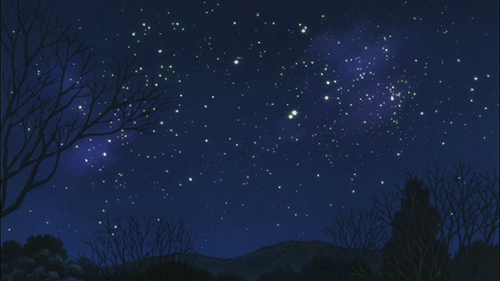
Yandere!Holy Knight stared at you in disbelief, your confession of what you had seen earlier this afternoon ringing in his ears. “You believe that this woman will bring harm to the Holy Temple, Sister Harrowhark?” He said. “If that is true, then why would the High Priest risk the safety of the congregation? Is it because of the influence of this…Affection Level? And why is my name there?” He was aghast. “How could anyone think of conquering someone if they do not consent to it or do not desire such a thing?”
Like the Brothers and Sisters of the Holy Temple, he had taken a vow of chastity alongside the oaths to protect them and the countrymen. Only clergymen or paladins who were high-ranking would be allowed to marry so long as the union was approved by both the High Priest and the Emperor.
You blinked at him, jeweled eyes glowing in sympathy as you slowly shook your head. “I do not know, truly. But if Reverend Sister Esther is coming after you, then you must put your safety and well-being above all else. Even my own.” You put your gloved hands in your mother-of-pearls robes, digging around in the pockets before you pulled out a drop-shaped peridot on a silver chain. You placed it in his open palm, and pushed his fingers forward to clench the hand into a loose fist.
Murky, violet orbs looked at you in confusion, astonishment, and fear. “Lady Harrowhark?” He whispered.
“Keep this on you, Sir Palamedes. The holy magic stored in here should be able to protect you from whatever this evil is, or at least I hope so. I was able to persuade the High Priest to postpone the announcement of Reverend Sister Esther’s baptism and my exile until after the Festival of the Stars. That will give us one week, while the others are celebrating Aesir’s creation of the world, to find everything we need to know about the Affection Level and how to remove it from Sister Esther before it can corrupt anyone else in the congregation.” You then stepped away from him, turning your back towards Yandere!Holy Knight and throwing the hood of your robe over your head.
“Recite your prayers, steady your hand, and for Aesir’s sake keep your distance from that woman.”
Then you left the training grounds, disappearing into the night and back towards the Sisters’ sleeping quarters, leaving Yandere! Holy Knight alone in his troubled thoughts. He knelt at his bedside that night, clutching the talisman you had given in his clasped hands as he dutifully murmured the prayers of Fidelity, Honor, and Strength. To protect him from evil’s temptation.
May Aesir grant him the strength to remain pure of heart and mind before he succumbs to his unholy feelings towards the Reverend Sister Harrowhark, God’s Beloved and the woman he should not have fallen in love with.
Taglist
@impeakcharacterdesign
@faesdreaming
@faux-ecrivain
@majestichugs
@abelheilonwife
@suiana
@lxdymoon0357
@dxmoness
@tired-of-life-86
@imperfectbloodmoon
@lovely-nightmares
@yandere-dark-cupid
@beardedblizzardexpert
@angelltheninth
@d10nsaint
@likesugarandcyanide
@justcressida
@mooly-artistic
@cassanderasblog
@swallowtailcherry
@amidst-the-tempest
@detectivesparrow
@thatstrangesheep
@average-yandere-enjoyer
@tonightwrites
@navierkalani
@cinderella-dreaming
@dragonempress18
©️do not repost or use any of the characters depicted here without the author’s permission. forbidden-sunlight, 2024
#forbidden-sunlight#yandere x reader#yandere male#yandere manhwa x reader#yandere#ns.fw#yandere oc#yandere!holy knight#tw obsession#tw sui ideation#tw sui attempt#fem!reader#tw manipulation#cw manipulation#cw sui ideation#cw sui attempt#minors do not interact#mdni
1K notes
·
View notes
Text
Today it's time for me to be heartbroken about Crowley and HIS version of events, because of course HIS version makes sense to him too.
The thing about Crowley is, he acts so nonchalant about everything.

Like, at first, he's simply just a demon. Sauntered vaguely downward and such, it's barely even really a thing, honestly -- it's just sort of his job title, y'know? Aziraphale's in one department, he's in another, that's just how it is. Like satanists, right?
But then the more the story progresses, the more we get the sense that there's something deeper than that. It becomes especially apparent with his plants, and how he puts the fear of God (then corrected by the narrator: the fear of Crowley) in them.

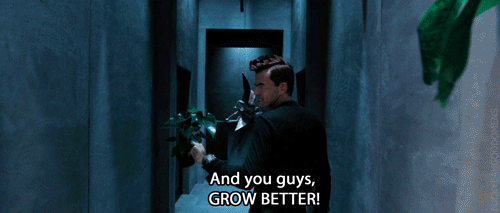
And these scenes, as many of you well know, have been theorized to be Crowley working through the circumstances of his fall. Projecting his emotions onto the plants, inflicting on them what was done to him. Processing what it was like to be on the other side of the curtain, maybe -- possibly try to figure out what could drive a creator to harm their own creations.
The details of the fall and what Crowley did, exactly, are unclear. The details of what Crowley knows about his own fall are unclear, because evidence could suggest that maybe he doesn't remember. But his perception seems to be that it didn't take much to be a demon.

What he does know, is that nothing lasts forever -- not even the grace of God.
But Aziraphale is different.

Aziraphale is an angel with very black-and-white ideas of what it means to be an angel, and what it means to be a demon.
But Crowley sees through it. From giving away the sword alone, he sees the cracks in Aziraphale's rigid thinking that allows the light to shine through. And he chips and he chips at that thinking -- he asks the kind of questions that probably made him fall in the first place -- until finally we get here.

God saw Crowley at his most innocent. God saw Crowley at his most joyful state of being. God saw him at his holiest.
God heard his questions, likely knowing that Crowley was expressing love in the way that he would want to receive it. Crowley says, "Well, if I was the one running it all, I would like it if someone asked questions. Fresh point of view."
God knew all of this, and then cast him out anyway. Unforgivable, that's what he is. Not to be forgiven, ever. Not to be loved -- not by God.
Then here comes along this angel (who he may or may not remember). This angel knows he's a demon, and talks to him anyway. This angel knows he's a demon, and listens to what he has to say. This angel knows he's a demon, and still looks him in the eye, sees the good in him, and forcefully tells him that HE still sees the good in him, even when God refuses to.
Aziraphale sees everything in Crowley that God could not, and that is something Crowley thought was lost forever.

So it only makes sense that when Aziraphale first burst in with his words all aflutter at the idea that they were going to go back to Heaven and change everything, Crowley felt this was something they couldn't do. Because he understands better than anyone, Heaven has the power to change the angel, the angel does not have the power to change Heaven.
It makes sense that Crowley gave him a chance. Crowley didn't exactly erupt with rage at Aziraphale. Yes, he was loudly against the idea and very disappointed, but then he goes, "Oh. Oh God. Right. Okay. I didn't get a chance to say what I was going to say, I better say it now."
He still thinks there's a chance. He's still giving Aziraphale a chance to back out.
He gives Aziraphale multiple chances. And every time Aziraphale will not back down. Every time, he thinks he hears the same message. The one he's always heard, the one he should know by now but somehow still hopes it isn't true.
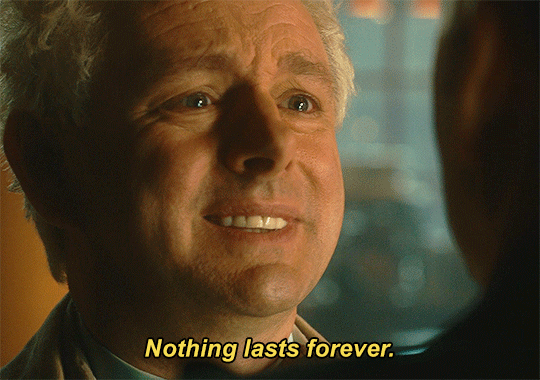
Nothing lasts forever.
Not the universal star machine.
Not the grace of God.
Not the bookshop.
Not my acceptance of who you are.
Not us.
He doesn't hear the way Aziraphale remembers his joy and wants him to be happy. He doesn't hear how Aziraphale wants him and needs him and begs for him to be on his side. He doesn't hear the hope and the desire to be safe and together and in control -- forever.
He doesn't hear the way Aziraphale is lying to himself because we all know damn well he would live in a state of comfortable happiness if he could.
Instead, he hears this.

He hears that he is in need of forgiveness. He hears that he has done something to warrant it.
Only, he is unforgivable. Nothing lasts forever, but maybe that part does. Out of everything that never lasted, the one that did is that he is unforgivable the way that he is.
"Don't bother," he says.
Don't bother, because he doesn't hear Aziraphale, he hears God.
Don't bother, because maybe God was right.
#good omens#gos2spoilers#good omens meta#Crowley#the DEPTH of this scene#two characters speaking in entirely different planes of existence#two entirely different messages from opposite sides
2K notes
·
View notes
Text
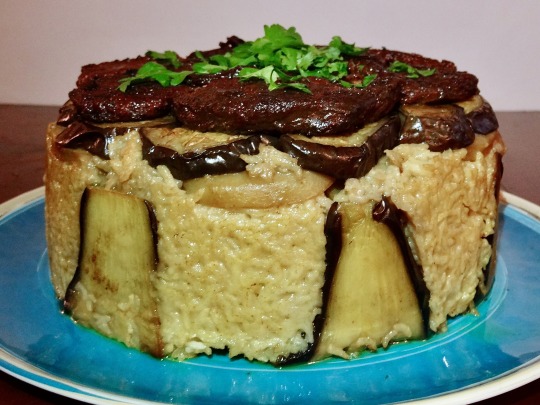
[ID: A wide cylindrical pile of rice, eggplants, and 'lamb' on a serving platter, garnished with parsley. End ID]
مقلوبة / Maqluba
مَقْلُوبَة ("maqlūba," "upside down" or "turned over") is a Levantine casserole in which spiced meat, fried vegetables, and rice are arranged in a pot and simmered; the entire pot is then inverted onto a serving tray to reveal the layered ingredients. Maqluba historically uses lamb and eggplant, but modern recipes more often call for chicken; tomato, cauliflower, potato, bell pepper, and peas are other relatively recent additions to the repertoire.
A well-made maqluba should be aromatic and highly spiced; the meat and vegetables should be very tender; and the rice should be cohesive without being mushy. A side of yoghurt gives a tangy, creamy lift that cuts through and complements the spice and fat in the dish.
Maqluba emphasizes communal eating and presentation. It is usually eaten during gatherings and special occasions, especially during Ramadan—a month of sunrise-to-sunset fasting which celebrates the revelation of the Qu'ran to the prophet Mohammad. The pot is sometimes flipped over at the table for a dramatic reveal.
History
Many sources cite Muhammad bin Hasan al-Baghdadi's 1226 Kitāb al-ṭabīkh (كتاب الطبيخ لمحمد بن حسن البغدادي) as containing the first known reference to maqluba. However, the recipes for "maqluba" in this book are actually for small, pan-fried patties of spiced ground meat. [1] The dish is presumably titled "maqluba" because, once one side is fried, the cook is instructed to turn the patties over ("أقلب الوجه الآخر") to brown the other; the identical name to the modern dish is thus coincidental.
References to dishes more like modern maqluba occur elsewhere. A type of مغمومة ("maghmūma," "covered" dish), consisting of layers of meat, eggplant, and rice, covered with flatbread, cooked and then inverted onto a serving plate, is described in a 9th-century poem by إبراهيم بن المهدي (Ibrāhīm ibn al-Mahdī):
A layer of meat underneath of which lies a layer of its own fat, and another of sweet onion, another of rice,
Another of peeled eggplant slices, each looking like a good dirham honestly earned. [...]
Thus layered the pot is brought to a boil first then enclosed with a disc of oven bread.
On the glowing fire it is then put, thus giving it what it needs of heat and fat.
When fully cooked and its fat is well up, turn it over onto a platter, big and wide. (trans. Nawal Nasrallah) [2]
These sources are both Iraqi, but one story holds that maqluba originated in Jerusalem. صلاح الدين الأيوبي (Ṣalāḥ ad-Dīn al-Ayyūbi; "Saladin"), after capturing the city from the Crusaders and reinstating Muslim rule in 1187, was served the dish, and was the first to describe it with its current name. Before this point, the Jerusalem specialty had supposedly been known as "باذنجانية" ("bāḏinjānīyya"), from "باذنجان" "bāḏinjān" "eggplant" + ية- "-iyya," a noun-forming suffix.
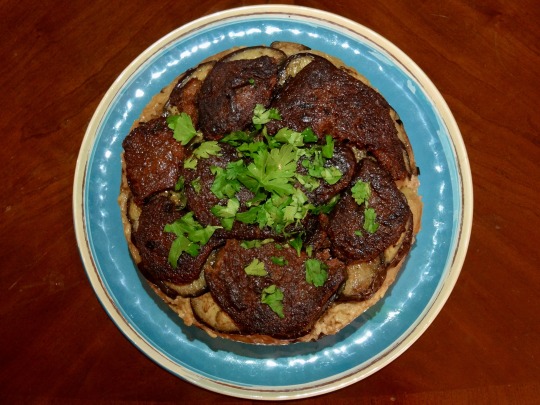
[ID: The same dish shown from directly above. End ID]
In Palestine
Maqluba is often invoked in the context of Palestinian strength and resistance, in defiance of its occasional description as an "Israeli" dish. Palestinian magazine writer Aleeya Rizvi reflects:
In the wake of the recent [2023] war in Gaza, our culinary endeavors, particularly in crafting and sharing traditional Palestinian dishes like Maqluba, represent a conscious effort to contribute to the preservation and resilience of Palestinian culture. In a time when cultural heritage is under threat, preparing and enjoying these time-honored recipes becomes more than a mere culinary activity; it transforms into a deliberate act of cultural continuity and solidarity.
Maqluba also has a more specific association with physical resistance against the backdrop of increased settler and police violence against Palestinians, including regular Israeli raids and attacks on the جامع الأقصى ("Jāmi' al-Aqṣā"; al-Aqsa mosque), during Ramadan.
The holiest month in the Islamic calendar, Ramadan is given over to fasting, prayer, and reflection; people gather together in homes and mosques to break their fast after sunset, and spend entire nights in mosques in worship. Khadija Khwais and Hanady Al-Halawani used to serve maqluba for افطار ("ifṭār," fast-breaking meal) in the Al-Aqsa mosque, until Israeli occupation authorities banned them from the mosque for "incitement."
In response, starting in 2015, Al-Halawani and other volunteer مرابطين ("murābiṭīn," lit. "holy people," guardians of the mosque) stationed themselves on the ground outside the mosque's gate (باب السلسلة; Bāb as-Silsila, "chain gate") to prepare and serve maqluba. Those who were banned from entering the mosque broke their fast and prayed at the mosque's gates, and in the nearby alleys of the Old City. The same year saw Israeli security personnel and settlers attack Palestinian protestors and guardians outside and inside the mosque with tear gas and stun grenades.
For Al-Halawani, the serving of maqluba at the al-Aqsa gates symbolizes "defiance, steadfastness, and insistence on continuing the fast [...] in spite of the occupation’s practices." The "Maqluba at al-Aqsa" ritual "has become one of the most disturbing Palestinian scenes for the occupation forces," who associate it with the defense of "Palestinian heritage" and the intent to "motivate worshipers and murabitin to repel incursions into the mosque." (Al-Halawani has been arrested, threatened, beaten, and detained by Israeli police multiple times for her role as a defender of Al-Aqsa. She was among the prisoners freed in trades between Israel and Hamas in December 2023.)
In 2017, occupation forces installed metal detectors, electronic gates, metal barriers, and police cameras to surveil worshipers following a shoot-out at one of al Aqsa's gates. Hundreds of protesters refused to enter the mosque until the repressive measures were removed, instead gathering and praying in its courtyard; surrounding families bolstered the sit-ins by serving food and drink. When the gates were dismantled, over 50,000 people gathered to eat maqluba in celebration, picking up on the earlier association of the dish with Saladin's victory (and its resultant alternate name, "أكلة النصر," "ʔakla an-naṣr," "victory meal").
The name "maqluba," meaning "upside-down" or "inverted," may be associated with victory and resistance as well. Fatema Khader noted in 2023 that the method of serving maqluba was a "symbolic representation of how Israeli policies and decisions against Palestinians will be flipped on their heads and become rendered meaningless." It is also relevant that maqluba is meant to be served to large groups of people, and can thus be linked, symbolically and literally, to solidarity and communal resistance.
This year in Gaza, Palestinians show steadfast optimism as they paint murals, hang lanterns, buy sweets, hold parties, and pray in groups amongst the rubble where mosques once stood. But despite these efforts at creating joy, the dire circumstances take heavy tolls, and the holiday cannot be celebrated as usual: Israel's campaign of slow starvation led Ghazzawi Diab al-Zaza to comment, "We have been fasting almost against our will for three months".
Donate to provide hot meals in Gaza for Ramadan
[1] Also reprinted in Mosul: Umm Al-Rubi'in Press (مطبعة ام الربيعين) (1934), p. 57. For an English translation see Charles Perry, A Baghdad Cookery Book (2005), pp. 77-8.
[2] This poem, as well as one of Ibn al-Mahdi's maghmuma dishes, were compiled in Ibn Sayyar al-Warraq's 10th-century Book of Dishes (كتاب الطبيخ وإصلاح الأغذية المأكولات وطيّبات الأطعمة المصنو; "Kitāb al-ṭabīkh waʔiṣlāḥ al-ʔaghdiyat al-maʔkūlāt waṭayyibāt ʔaṭ'ima al-maṣno," "Book of cookery, food reform, delicacies, and prepared foods"), p. 99 recto. For Nasrallah's English translation see Annals of the Caliph's Kitchens, pp. 313-4.
In the 14th-century Andalusian Cookbook (كتاب الطبيخ في المغرب والأندلس في عصر الموحدين، للمكلف المجهول; "Kitāb al-ṭabīkh fī al-Maghrib wa al-Andalus fī ʻaṣr al-Mawahḥidīn," "Book of cookery from the Maghreb and Andalusia in the era of Almohads"), a maghmuma recipe appears as "لون مغموم لابن المهدى", "maghmum by Ibn al-Mahdi". For an English translation see An Anonymous Andalusian Cookbook, trans. Perry et al.
Ingredients:
For a 6-qt stockpot. Serves 12.
For the meat:
1 recipe seitan lamb
or
2 cups (330g) ground beef substitute
1 cinnamon stick
1 bay laurel leaf
Pinch ground cardamom
Several cracks black pepper
For the dish:
3 cups (600g) Egyptian rice
2 medium-sized globe eggplants
2 large Yukon gold potatoes (optional)
Vegetarian 'chicken' or 'beef' bouillon cube (optional)
2 1/2 tsp table salt (1 1/2 tsp, if using bouillon)
Vegetable oil, to deep-fry
Fried pine nuts or sliced blanched almonds, to top
Egyptian rice is the traditional choice in this dish, but many modern recipes use basmati.
I kept my ingredients list fairly simple, but you can also consider adding cauliflower, carrots, peas, chickpeas, zucchini, bell pepper, and/or tomato to preference (especially if omitting meat substitutes).
For the spices:
1 1/2 Tbsp maqluba spices
or
1 4" piece (3g) cinnamon bark, toasted and ground (1 1/2 tsp ground cinnamon)
3/4 tsp (2.2g) ground turmeric
3/4 tsp (1.5g) cloves, toasted and ground
3/4 tsp (2.2g) black peppercorns, toasted and ground
15 green cardamom pods (4.5g), toasted, seeds removed, and ground (or 3/4 tsp ground cardamom)
Instructions:
For the meat:
1. Prepare the seitan lamb, if using: it will need to be started several hours early, or the night before.
2. If using ground meat: heat 2 tsp oil in a skillet on medium. Add cinnamon stick and bay leaf and fry for 30 seconds until fragrant.
3. Add meat and ground spices and fry, agitating occasionally, until browned. Set aside.
For the dish:
2. Rinse rice 2 to 3 times, until water runs almost clear. Soak in cold water for 30 minutes, while you prepare the vegetables.
3. Optional: to achieve a presentation with eggplant on the sides of the maqluba, remove the skin from either side of one eggplant (so that all slices have flesh exposed on both sides) and then cut lengthwise into 1/2" (1cm)-thick slices.
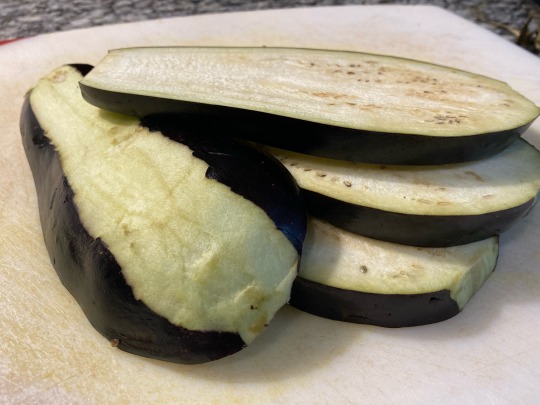
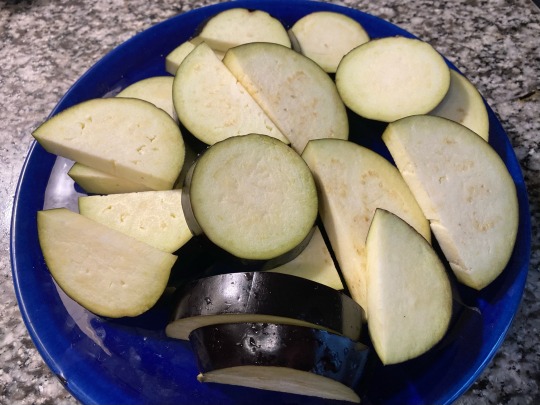
Cut the other eggplant (or both eggplants) widthwise into coins and half-coins.
4. Sprinkle eggplant slices with salt on both sides and leave for 10-15 minutes to release water.
5. Peel potatoes and cut in 1/4" (1/2 cm) slices.
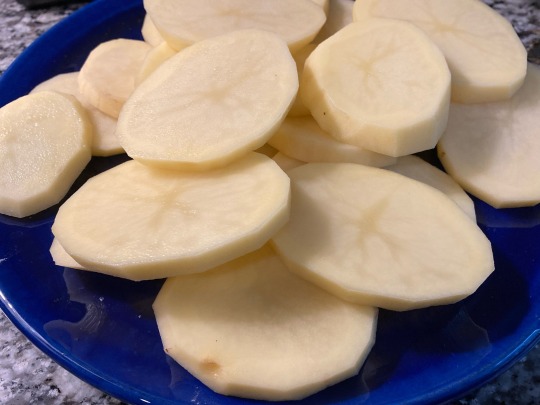
6. Heat about an inch of oil in a deep skillet or wok on medium (a potato slice dropped in should immediately form bubbles). Fry the potato slices until golden brown, then remove onto a paper-towel-lined plate or wire cooling rack.
7. Press eggplant slices on both sides with a towel to remove moisture. Fry in the same oil until translucent and golden brown, then remove as before.
Fry other vegetables (except for tomato, chickpeas, and peas) the same way, if using.
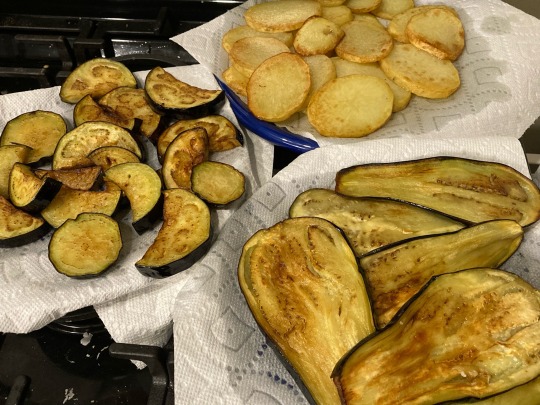
8. Drain rice. Whisk bouillon, salt, and ground spices into several cups of hot water.
9. Prepare a large, thick-bottomed pot with a circle of oiled parchment paper (or with a layer of sliced tomatoes). Add ground meat, if using. Layer widthwise-sliced eggplants into the pot, followed by potatoes. Place longitudinally sliced eggplants around the sides of the pot, large side up.
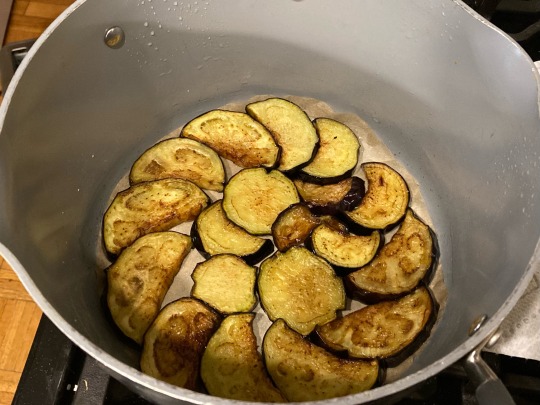
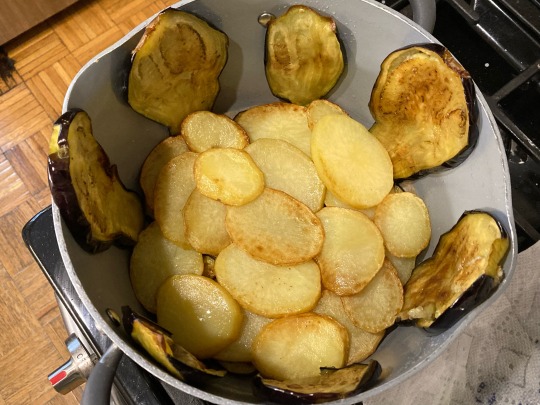
10. Add rice and pack in. Fold eggplant slices down over the rice, if they protrude.
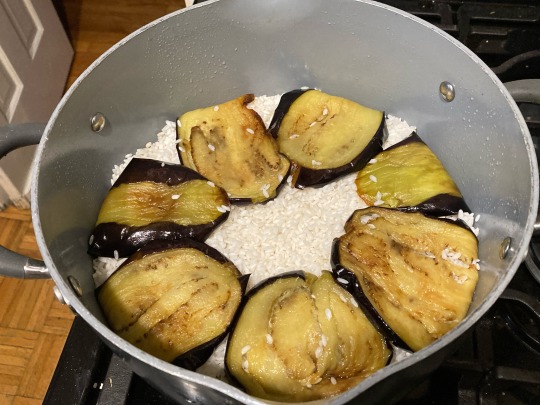
11. Pour broth into the pot, being careful not to upset the rice. Add more water if necessary, so that the rice is covered by about an inch.
12. Heat on medium to bring to a boil. Reduce heat to low, cover with a closely fitting lid, and cook 30 minutes.
13. If rice is not fully cooked after 30 minutes, lightly stir and add another cup of water. Re-cover and cook another 15 minutes. Check again and repeat as necessary.
14. Allow maqluba to rest for half an hour before flipping for best results. Place a large platter upside-down over the mouth of the pot, then flip both over in one smooth motion. Tap the bottom of the pot to release, and leave for a few minutes to allow the maqluba to drop.
15. Slowly lift the pot straight up, rotating slightly if the sides seem stuck.
16. Top with fried seitan lamb, chopped parsley, and fried pine nuts or almonds, as desired.
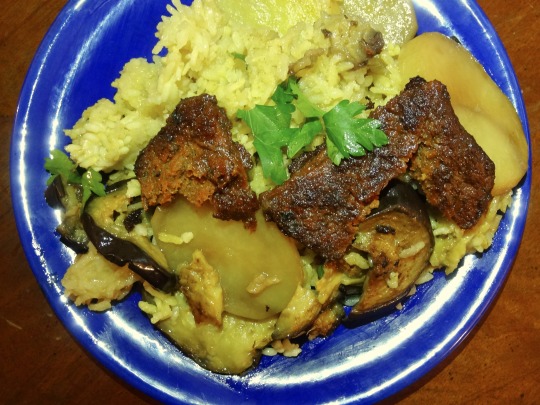
359 notes
·
View notes
Text
Please remember me - Azriel x Reader
Ok but just imagine how heartbroken Az would be if he lost the woman he loved, but when the Cauldron brings her back, she doesn't have any memories of him.
It's after midnight and I'm feeling things...

___________________
You broke through the frigid darkness, something fragmenting beneath your fingers into a million sharp pieces as you wrenched your body up and gasped for breath.
Freezing. You were freezing to death in a pool of water. Or so you thought. Weak, uncooperative limbs flung over the lip of the pool, rough skin grabbing hold of you. You spilled out of the Cauldron into Azriel's waiting arms, and he wasted no time in burying his face into the crook of your neck, breathing in your familiar scent no longer tainted bitter and metallic by blood.
"Thank the gods. Y/n. I thought... I thought I lost you. Y/n. Y/n." He whispered your name over and over. A word more precious than the holiest of prayers.
You basked in the safety of his arms, the strength in the hands that gripped your hip and cradled the back of your head. That feeling of safety didn't go away when the stranger pulled back, molten hazel eyes staring into yours. He was the most beautiful male you'd ever seen. A face composed of graceful lines broken up by the tragic pain in his eyes, the tears that traced a path down his cheeks, the pained smile. He looked at you the way mates did in all the stories you'd read. Like holding you was the same as holding the world in his palms.
But when he kissed you, stealing the breath from your lungs like he was the one that had nearly drowned, you knew you needed to put a stop to this. One hand on his chest, the faintest hesitation on your lips, was all it took for him to pull away, eyes searching your body for any sign of hurt.
"Y/n? What is it? What's wrong, love?"
You hesitated. Your name was familiar on his lips, like it belonged there, like it belonged to him. But none of that changed the fact that you had no idea who this raven-haired male was.
"I-I don't..." You didn't want to say it. Didn't want to break the look of hope and relief on his face.
"Y/n?"
You finally noticed the small collection of fae behind him. A striking female with silver-tinted eyes beside a male as strong and wide as a mountain, Illyrian wings held tight against his spine like a notched arrow. A male and female, clearly mated, looking like figures carved from the fabric of the night sky. A female in red with golden-blond hair and doe-brown eyes. All of them weeping, or wiping away tears from red-rimmed eyes.
"Y/n? Please, look at me." Azriel begged, "Please." He whispered, feeling the tension in your body and the panic in your eyes, "Talk to me. What's wrong?"
When your eyes slid back to him, his heart plummeted in his chest, nose diving faster than he'd ever fallen in his life. He knew what words would tumble off your tongue before you said them. The confusion in your eyes spoke volumes.
"I don't... I don't know you."
The room stilled, voices trapped in everyone's throats along with their breath, and Azriel's hope shattered into a million pieces.
#azriel shadowsinger#azriel x reader#azriel x y/n#azriel x you#azriel angst#azriel acotar#please remember me#angst#reader x inner circle#the night court#acotar#acotar fanfiction
524 notes
·
View notes
Note
I'm fairly sure from tumblr osmosis people getting into Dracula daily know that Dracula has homoerotic subtext of different shades, but wonder if people are also aware of how lovestruck and wild the main het couple is for eachother because oh boy I, gayman supreme, was caught unawares
It's so refreshing in classic literature, to say nothing of creative media in general, to really be cracked upside the head with how endearing and intense Jonathan and Mina's romance is. Mainly because Het Couple Default is so often just taken as that. The default. If there's a main guy, there'll be a girl, and the story says 'Oh yeah they're together and in love or whatever, damsel things will probably happen,' and you just take that as another square on the bingo card.
But then we get to see Mr. and Mrs. Holiest Love in action.
Mr. and Mrs. 'I Will Love and Support and Protect My Beloved against All Rules, Decorum, and Expectations.'
Mr. and Mrs. 'If She Cannot Have Heaven, I Will Throw in with Hell.'
Mr. and Mrs. 'Would Rather Die Than Hurt You, Would Rather Kill Than See You Endangered.'
They are just. So much.
And it's so unexpected and wonderful and so so blindsiding to first-time readers who only have a background of lackluster media couples and incredibly warped takes from Dracula media osmosis to go off of. Which is all to say, I know new people are going to be concussed with this revelation and I cannot WAIT to see it.
#holiest love#is taken seriously in this house (book)#jonathan harker#mina harker#dracula#dracula daily#re: dracula
2K notes
·
View notes
Text
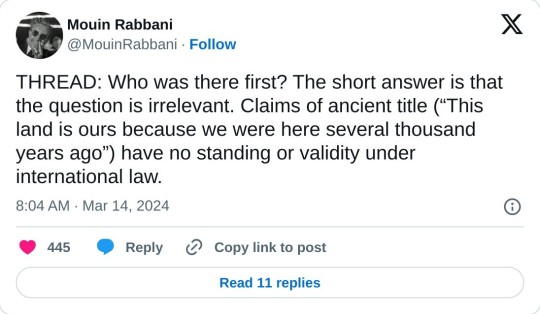
twitter thread by Mouin Rabbani
March 14, 2024
Who was there first? The short answer is that the question is irrelevant. Claims of ancient title (“This land is ours because we were here several thousand years ago”) have no standing or validity under international law.
For good reason, because such claims also defy elementary common sense. Neither I nor anyone reading this post can convincingly substantiate the geographical location of their direct ancestors ten or five or even two thousand years ago.
If we could, the successful completion of the exercise would confer exactly zero property, territorial, or sovereign rights.
As a thought experiment, let’s go back only a few centuries rather than multiple millennia. Do South Africa’s Afrikaners have the right to claim The Netherlands as their homeland, or even qualify for Dutch citizenship, on the basis of their lineage?
Do the descendants of African-Americans who were forcibly removed from West Africa have the right to board a flight in Atlanta, Port-au-Prince, or São Paolo and reclaim their ancestral villages from the current inhabitants, who in all probability arrived only after – perhaps long after – the previous inhabitants were abducted and sold into slavery half a world away?
Do Australians who can trace their roots to convicts who were involuntarily transported Down Under by the British government have a right to return to Britain or Ireland and repossess homes from the present inhabitants even if, with the help of court records, they can identify the exact address inhabited by their forebears? Of course not.
In sharp contrast to, for example, Native Americans or the Maori of New Zealand, none of the above can demonstrate a living connection with the lands to which they would lay claim.
To put it crudely, neither nostalgic attachment nor ancestry, in and of themselves, confer rights of any sort, particularly where such rights have not been asserted over the course of hundreds or thousands of years.
If they did, American English would be the predominant language in large parts of Europe, and Spain would once again be speaking Arabic.
Nevertheless, the claim of ancient title has been and remains central to Zionist assertions of not only Jewish rights in Palestine, but of an exclusive Jewish right to Palestine.
For the sake of argument, let’s examine it. If we put aside religious mythology, the origin of the ancient Israelites is indeed local.
In ancient times it was not unusual for those in conflict with authority or marginalized by it to take to the more secure environment of surrounding hills or mountains, conquer existing settlements or establish new ones, and in the ultimate sign of independence adopt distinct religious practices and generate their own rulers. That the Israelites originated as indigenous Canaanite tribes rather than as fully-fledged monotheistic immigrants or conquerors is more or less the scholarly consensus, buttressed by archeological and other evidence. And buttressed by the absence of evidence for the origin stories more familiar to us.
It is also the scholarly consensus that the Israelites established two kingdoms, Judah and Israel, the former landlocked and covering Jerusalem and regions to the south, the latter (also known as the Northern Kingdom or Samaria) encompassing points north, the Galilee, and parts of contemporary Jordan. Whether these entities were preceded by a United Kingdom that subsequently fractured remains the subject of fierce debate.
What is certain is that the ancient Israelites were never a significant regional power, let alone the superpower of the modern imagination.
There is a reason the great empires of the Middle East emerged in Egypt, Mesopotamia, Persia, and Anatolia – or from outside the region altogether – but never in Palestine.
It simply lacked the population and resource base for power projection. Jerusalem may be the holiest of cities on earth, but for almost the entirety of its existence, including the period in question, it existed as a village, provincial town or small city rather than metropolis.
Judah and Israel, like the neighboring Canaanite and Philistine entities during this period, were for most of their existence vassal states, their fealty and tribute fought over by rival empires – Egyptians, Assyrians, Babylonians, etc. – rather than extracted from others.
Indeed, Israel was destroyed during the eighth century BCE by the Assyrians, who for good measured subordinated Judah to their authority, until it was in the sixth century BCE eliminated by the Babylonians, who had earlier overtaken the Assyrians in a regional power struggle.
The Babylonian Exile was not a wholesale deportation, but rather affected primarily Judah’s elites and their kin. Nor was there a collective return to the homeland when the opportunity arose several decades later after Cyrus the Great defeated Babylon and re-established a smaller Judah as a province of the Persian Achaemenid empire. Indeed, Mesopotamia would remain a key center of Jewish religion and culture for centuries afterwards.
Zionist claims of ancient title conveniently erase the reality that the ancient Israelites were hardly the only inhabitants of ancient Palestine, but rather shared it with Canaanites, Philistines, and others.
The second part of the claim, that the Jewish population was forcibly expelled by the Romans and has for 2,000 years been consumed with the desire to return, is equally problematic.
By the time the Romans conquered Jerusalem during the first century BCE, established Jewish communities were already to be found throughout the Mediterranean world and Middle East – to the extent that a number of scholars have concluded that a majority of Jews already lived in the diaspora by the time the first Roman soldier set foot in Jerusalem.
These communities held a deep attachment to Jerusalem, its Temple, and the lands recounted in the Bible. They identified as diasporic communities, and in many cases may additionally have been able to trace their origins to this or that town or village in the extinguished kingdoms of Israel and Judah. But there is no indication those born and bred in the diaspora across multiple generations considered themselves to be living in temporary exile or considered the territory of the former Israelite kingdoms rather than their lands of birth and residence their natural homeland, any more than Irish-Americans today feel they properly belong in Ireland rather than the United States.
Unlike those taken in captivity to Babylon centuries earlier, there was no impediment to their relocation to or from their ancestral lands, although economic factors appear to have played an important role in the growth of the diaspora.
By contrast, those traveling in the opposite direction appear to have done so, more often than not, for religious reasons, or to be buried in Jerusalem’s sacred soil.
Nations and nationalism did not exist 2,000 years ago.
Nor Zionist propagandists in New York, Paris, and London incessantly proclaiming that for two millennia Jews everywhere have wanted nothing more than to return their homeland, and invariably driving home rather than taking the next flight to Tel Aviv.
Nor insufferably loud Americans declaring, without a hint of irony or self-awareness, the right of the Jewish people to Palestine “because they were there first”.
Back to the Romans, about a century after their arrival a series of Jewish rebellions over the course of several decades, coupled with internecine warfare between various Jewish factions, produced devastating results.
A large proportion of the Jewish population was killed in battle, massacred, sold into slavery, or exiled. Many towns and villages were ransacked, the Temple in Jerusalem destroyed, and Jews barred from entering the city for all but one day a year.
Although a significant Jewish presence remained, primarily in the Galilee, the killings, associated deaths from disease and destitution, and expulsions during the Roman-Jewish wars exacted a calamitous toll.
With the destruction of the Temple Jerusalem became an increasingly spiritual rather than physical center of Jewish life. Jews neither formed a demographic majority in Palestine, nor were the majority of Jews to be found there.
Many of those who remained would in subsequent centuries convert to Christianity or Islam, succumb to massacres during the Crusades, or join the diaspora. On the eve of Zionist colonization locally-born Jews constituted less than five per cent of the total population.
As for the burning desire to return to Zion, there is precious little evidence to substantiate it. There is, for example, no evidence that upon their expulsion from Spain during the late fifteenth century, the Sephardic Jewish community, many of whom were given refuge by the Ottoman Empire that ruled Palestine, made concerted efforts to head for Jerusalem. Rather, most opted for Istanbul and Greece.
Similarly, during the massive migration of Jews fleeing persecution and poverty in Eastern Europe during the nineteenth century, the destinations of choice were the United States and United Kingdom.
Even after the Zionist movement began a concerted campaign to encourage Jewish emigration to Palestine, less than five per cent took up the offer. And while the British are to this day condemned for limiting Jewish immigration to Palestine during the late 1930s, the more pertinent reality is that the vast majority of those fleeing the Nazi menace once again preferred to relocate to the US and UK, but were deprived of these havens because Washington and London firmly slammed their doors shut.
Tellingly, the Jewish Agency for Israel in 2023 reported that of the world’s 15.7 million Jews, 7.2 million – less than half – reside in Israel and the occupied Palestinian territories.
According to the Agency, “The Jewish population numbers refer to persons who define themselves as Jews by religion or otherwise and who do not practice another religion”.
It further notes that if instead of religion one were to apply Israel’s Law of Return, under which any individual with one or more Jewish grandparent is entitled to Israeli citizenship, only 7.2 of 25.5 million eligible individuals (28 per cent) have opted for Zion.
In other words, “Next Year in Jerusalem” was, and largely remains, an aspirational religious incantation rather than political program. For religious Jews, furthermore, it was to result from divine rather than human intervention.
For this reason, many equated Zionism with blasphemy, and until quite recently most Orthodox Jews were either non-Zionist or rejected the ideology altogether.
Returning to the irrelevant issue of ancestry, if there is one population group that can lay a viable claim of direct descent from the ancient Israelites it would be the Samaritans, who have inhabited the area around Mount Gerizim, near the West Bank city of Nablus, without interruption since ancient times.
Palestinian Jews would be next in line, although unlike the Samaritans they interacted more regularly with both other Jewish communities and their gentile neighbors.
Claims of Israelite descent made on behalf of Jewish diaspora communities are much more difficult to sustain. Conversions to and from Judaism, intermarriage with gentiles, absorption in multiple foreign societies, and related phenomena over the course of several thousand years make it a virtual certainty that the vast majority of Jews who arrived in Palestine during the late 19th and first half of the 20th century to reclaim their ancient homeland were in fact the first of their lineage to ever set foot in it.
By way of an admittedly imperfect analogy, most Levantines, Egyptians, Sudanese, and North Africans identify as Arabs, yet the percentage of those who can trace their roots to the tribes of the Arabian Peninsula that conquered their lands during the seventh and eighth centuries is at best rather small.
Ironically, a contemporary Palestinian, particularly in the West Bank and Galilee, is likely to have more Israelite ancestry than a contemporary diaspora Jew.
The Palestinians take their name from the Philistines, one of the so-called Sea Peoples who arrived on the southern coast of Canaan from the Aegean islands, probably Crete, during the late second millennium BCE.
They formed a number of city states, including Gaza, Ashdod, and Ashkelon. Like Judah and Israel they existed primarily as vassals of regional powers, and like them were eventually destroyed by more powerful states as well.
With no record of their extermination or expulsion, the Philistines are presumed to have been absorbed by the Canaanites and thereafter disappear from the historical record.
Sitting at the crossroads between Asia, Africa, and Europe, Palestine was over the centuries repeatedly conquered by empires near and far, absorbing a constant flow of human and cultural influences throughout.
Given its religious significance, pilgrims from around the globe also contributed to making the Palestinian people what they are today.
A common myth is that the Palestinian origin story dates from the Arab-Muslim conquests of the seventh century. In point of fact, the Arabs neither exterminated nor expelled the existing population, and the new rulers never formed a majority of the population.
Rather, and over the course of several centuries, the local population was gradually Arabized, and to a large extent Islamized as well.
So the question as to who was there first can be answered in several ways: “both” and “irrelevant” are equally correct.
Indisputably, the Zionist movement had no right to establish a sovereign state in Palestine on the basis of claims of ancient title, which was and remains its primary justification for doing so.
That it established an exclusivist state that not only rejected any rights for the existing Palestinian population but was from the very outset determined to displace and replace this population was and remains a historical travesty.
That it as a matter of legislation confers automatic citizenship on millions who have no existing connection with the land but denies it to those who were born there and expelled from it, solely on the basis of their identity, would appear to be the very definition of apartheid.
The above notwithstanding, and while the Zionist claim of exclusive Israeli sovereignty in Palestine remains illegitimate, there are today several million Israelis who cannot be simply wished away.
A path to co-existence will need to be found, even as the genocidal nature of the Israeli state, and increasingly of Israeli society as well, makes the endeavor increasingly complicated.
The question, thrown into sharp relief by Israel’s genocidal onslaught on the Palestinian population of the Gaza Strip, is whether co-existence with Israeli society can be achieved without first dismantling the Israeli state and its ruling institutions.
248 notes
·
View notes
Text
Had this weird story idea about a big dragon with runes all over him, and he's like a paper accordion that could unwind for thousands of miles, and the only way you could defeat him was if you were able to read every single rune on the dragon's papery body, and discern the long riddle of the princess who turned her labyrinthine library into her living armor in the form of a colossal and endless dragon . So far every knight that tried to off the dragon with fire, rain, whatever, was met with *death by a thousand paper cuts*. But the dragon don't really kill them, bc dragon is actually squeamish Lol. But since the entire kingdom is enrobed by the pages of a large dragon, there are entire university branches dedicated to discerning the riddle of the princess, why, why did she turn into a dragon, why is this her curse. And their culture shifts around literature, books and academia being treated as the holiest, most venerable form of knowledge. But anyway a cringefail and autistic kitchen boy loves math. He had come from a long line of dedicated scholars of the book. Boring and trifling matters like arithmetic were considered ignoble when in comparison to the mystery of the paper dragon. And the boy disagreed, of course. He loved books and all but was easily frustrated by them, he cannot focus on it, he needs the abstract to become concrete in his mind, he is the kind of boy who looks at a bridge and marvels at the sheer architecture it took to build a bridge before he is astounded by the bas relief;
he loves the world as it is and wants to tease out the blueprints. Anyway, when he was a boy, his mama used to tell him the story of the paper dragon, with only the first two pages of the dragons body being successfully interpreted by scribes. It had been about a princess who loved looking towards the stars and recording the sun's positions through refracted telescopes. And how she had a library filled with endless knowledge.
And the boy read and read the two pages and was enchanted by the mystery of the princess' riddle. In his teenaged life the boy would see the dragon flying above him while he was climbing an almond tree, and he makes out one of the pages along its infinite body as having similar lyrics to the known pages.
And it bothers the boy, all day he'd think about it. And he thinks about the princess who locked herself in her tower, watching the sun through refracted telescopes, and made dedicated sketches and notes every day to discern where the sun had spots; and it sort of connects in his mind that those sunspot sketches helped form an image of the sun, in a way, so he does the same.
Every day he'd just watch the dragon, and waited for the repeating lyric, and noted it down, until he had a long and fucked up diorama of the dragon; It takes him 12 years to be able to reliably predict where on the dragon's body the lyric shows up again.
when folded a certain way, in accordance to where the lyric shows up, the dragon's papery accordion body, the dragon forms a star at its core.
written in a spiral, the story forms into an answer to the princess' riddle; "I want to be free, I want to be free, I want to be free, I want to be free,"
over and over and over. In all aspects the princess who was a prince all along had wanted to be free, and the only way he could think of escaping the confines of his life and the fear of misunderstanding, of everyone wanting to harm him or to treat him as unnuanced a person for wanting to be something else...... was to transform into a paper dragon, more unquestionable than a normal human boy who loved drawing pictures of the sun-
The boy who loved math looked at the folded piece of paper in his hands, now he held the answer to the riddle of the prince, and he'd look to the sky to see the dragon flying above him like an endless kite. And he'd smile up at the dragon, scrunching the paper star in his hands. And hed whisper, I love you, I know you. I see you .
And he could have sworn the dragon smiled back at him.
#I have been trying to finish reading wheel of time for 12 years#insane trans guy rants#what if you were a princess and you wanted to be a boy and a dragon#also what if they were in love#someone give me 150 usd ill draw this as a comic
320 notes
·
View notes
Text
I think Vax seeing the Raven Queen is a conscious choice on her part but the more I think about it the more that fascinates me. It’s not just that Vax sees the Raven Queen, it’s that she sees him. She appears in death and winter as is her prerogative but each time she turns towards him. Even from the top of a temple across the city, she stops, straightens up, and studies Vax.
She’s not just watching him in the way that gods watch mortals. For entertainment or distant usefulness. She has clerics and acolytes and holy people to do her bidding. Who would love to be her champion. Who serve her and are waiting for her call. She has granted power and ability to any number of people since her ascension and I have no doubt that some have seen her in her holiest places, but Vax is not hers. Not yet. And she still appears.
Not only is he not hers, thus far he has been largely ambivalent to the gods as a whole. But here she is studying Vax. Fate-touched as we know he is, her interest admittedly makes sense but she’s not just trusting in fate here. The Raven Queen believes in fate and inevitability with a conviction that is rooted in her own divinity. She sees the strings of fate like no one else can. And yet.
She is making a deliberate choice to show her interest in a way that he will understand. Before the pieces fall into place she is making moves that very likely direct his actions. Shaping his story or at the very least steering him towards a specific choice. She is the god of fate, the god of the inevitable, and yet she is choosing to interfere.
It’s so much easier to believe that what is coming next is inevitable. But I don’t think it is. If it was there would be no reason for the Raven Queen to steer the course of fate. She is studying Vax because it is truly his choice. Because her champion isn’t a person brought to her by inevitability but one who has to decide for himself in one specific moment that this is the fate he’d rather have.
896 notes
·
View notes
Text

KINKTOBER | seventeen
every story is going to be between 500 - 2k words and they will all contain smut. the kinks will vary per story so please read the warnings at the beginning of every story before you read them! MDNI, everything is going to be explicit and wont be suitable for minors (or anyone that is uncomfortable with nsfw).

XMH • oct. 1
vampire!hao - feeding time for hao is never dull, but this time it takes a turn when you both finally show just how much you like it when he feeds from you
bloody kisses

LSM • oct. 3
demon!seokmin - whoever said church was the holiest place on earth has never stepped foot into yours
(un)holy water

LJH • oct. 5
incubus!woozi - it’s second nature for woozi to seduce people, what isn’t apart of his nature is getting seduced by you
second nature

CSC • oct. 7
husband!cheol - he takes the day off to suprise you with a bath when you get home from running errands
overflowed

HVC • oct. 9
brothers best friend!vernon - your brother has warned you a lot about how his friends are bad influences but vernon takes the cake
intoxicated

LC • oct. 11
best friends brother!chan - you weren’t suppose to fall for your best friends brother but it was hard not to when he looks at you with those round doe eyes
doe eyes

YJH • oct. 13
ceo!jeonghan - you’re tasked to escort jeonghan to an important business meeting but he has other plans when he asks you to pull the car over
tinted windows

KMG • oct. 15
werewolf!mingyu - he tries to keep track of when he goes into heat but sometimes his math is a little off
hot, hot

JWW • oct. 17
gamer bf!wonwoo - you test to see just how good your boyfriends self control is and his friends are totally in on it
control me

WJH • oct. 19
lifeguard!jun - it’s after hours at the country club and you and jun decide to enjoy some alone time in the pool
dive in

KSY • oct. 21
ex!soonyoung - you finally get the courage to go pick your stuff up from soonyoung place, a long overdue conversation leads you back to his bed where he makes you question why you left him in the first place
fragile heart

HJS • oct. 23
next door neighbor!joshua - unfortunately in the middle of your shower your hot water breaks so you have to go next door and ask your unnaturally hot neighbor if you can use his
steamy

BSK • oct. 25
guardian angel!seungkwan - seungkwan wasn’t as holy as everyone though he was, especially since he’s fucking the person he swore to protect
my angel

HHU • oct. 27
hip hop unit headcanons! - they like to bring a little thrill to the bedroom in the form of knives
knifeplay

VU • oct. 29
vocal unit headcanons! - they cant keep their hands off you, especially your neck
choking

PU • oct. 31
performance unit headcanons! - you're their perfect little angel and they love to ruin you
corruption

© duhnova 2022, please do not repost
#duhnova kinktober 2022#seventeen smut#seungcheol smut#jeonghan smut#joshua smut#vernon smut#soonyoung smut#woozi smut#chan smut#seokmin smut#jun smut#minghao smut#seongkwan smut#mingyu smut#wonwoo smut
2K notes
·
View notes
Text
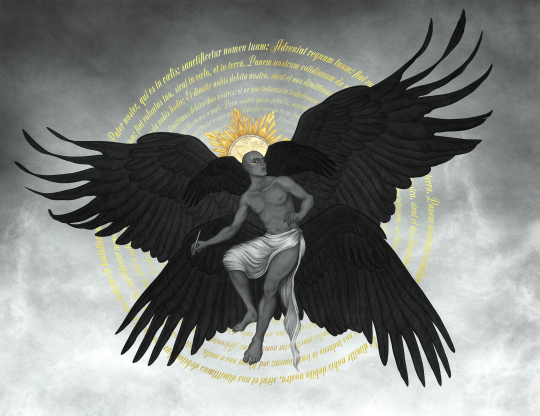
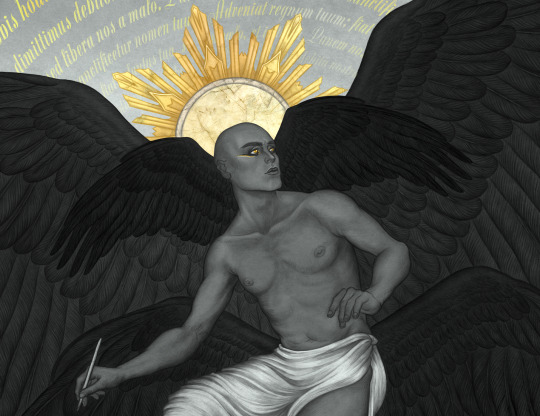
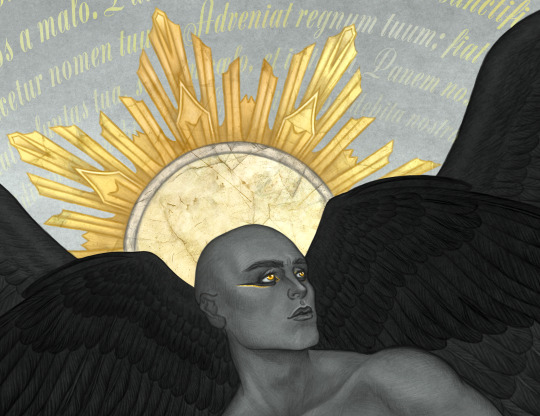
Completed version of Angeltober prompt "Calligraphy," featuring my character Uriel. For additional worldbuilding lore regarding this image, please read the [post on instagram]
[patreon] [instagram] [ko-fi]
61 notes
·
View notes
Photo
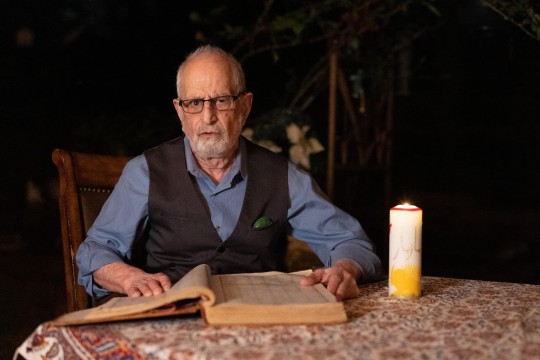
(14/54) “We began in darkness. Three hundred years after the Battle of Nahavand. The invaders had plundered the country. Caravans of riches were leaving day and night. There was a huge push to break our unity, to erase our identity, to make us forget ourselves. And whenever a conqueror tries to destroy a people, they begin with the language. Scholars were murdered. Books were burned. Entire libraries were razed to the ground. Whenever words were found, they were destroyed. A knight gathered all the texts that remained. And Ferdowsi stepped forward to weave them into a poem. In the prologue of Shahnameh he writes: ‘I am building a castle of words. That no wind or rain will destroy!’ Ferdowsi attempted to use only the purest form of Persian. He wanted to preserve the entirety of our language. All of our words. But it wasn’t just our language that he was trying to save, it was our story. Our wisdom. Our soul. Who we were. Ferdowsi drew from many different sources when writing Shahnameh. But one of the most important was The Avesta. The holiest book in ancient Iran. It included many of our oldest stories, from before the written word. In the heart of the book, away from the edges, safe from the sands of time, were the oldest words of Iran: the seventeen hymns of Zoroaster. They were three thousand years old. And they’re in the form of a poem. They tell the story of a battle between two great spirits: Ahura Mazda and Ahriman. Good and Evil. Light and Dark. Since the beginning of time these two spirits have been locked in a battle for the soul of the world. And every person must participate. There can be no spectators. There is always a choice to be made. Light or Dark. Good or Evil. 𝘕𝘦𝘦𝘬𝘪 or 𝘉𝘢𝘥𝘪. It’s a simple choice. But in that choice is an escape from destiny. A promise that the book is not yet written. There is still a role for us to play.”
در تاریکی آغاز شد. سیسد سال پس از جنگ نهاوند غارتگران داراییهای سرزمین ما را به تاراج برده بودند. کاروانهای انباشته از زر و گوهر روز و شب خارج میشدند. کارزار فراگیری برای از میان بردن هویت ایرانی به راه انداخته بودند. از زبانمان آغاز کردند. هر گاه فاتحی کمر به نابودی ملتی ببندد، بخواهد هویت آنها را از بین ببرد، بخواهد اتحاد آنها را بشکند، بخواهد آنها را از خود بیگانه کند، از زبان میآغازد. زبان آوند فرهنگمان است. نگهدارندهی تمامی گذشتهمان است. چسبیست که ما را در کنار هم نگه میدارد. دانشمندان کشته شدند. کتابها سوزانده شدند. تمامی کتابخانهها با خاک یکسان شدند. هر گاه نوشتههایی یافت میشد، نابود میکردند. فردوسی مینویسد که پهلوانی همهی نوشتههای بازمانده را گرد آورد. سپس فردوسی پذیرفت تا همه را به شعر برگرداند. او چنین سرود: پی افکندم از نظم کاخی بلند / که از باد و باران نیابد گزند! فردوسی کوشید که از نابترین واژگان فارسی استفاده کند. میخواست یکپارچگی زبانمان را پاس دارد. ولی این تنها واژگانمان نبودند که در تلاش پاسداری از آن بود، بلکه داستانهایمان نیز بود. جان و روان و شناسهی ما. آنچه که بودیم. در نوشتن شاهنامه، فردوسی از منابع گوناگون بسیاری بهره برد. برجستهترین آنها اوستا بود. کتاب سپنتای ایران. دربرگیرندهی کهنترین داستانهایمان از دوردست روزگار. در دل کتاب، دور از متنهای حاشیهای، در امان از گردباد زمانه، کهنترین واژگان و سخنان و نوشتههای ایران گنجانده شده بود: هفده گاتای زرتشت. با قدمتی سههزارساله که به شعر نوشته شدهاند. داستان نبرد میان دو نیروی بزرگ را روایت میکند: اهورا مزدا و اهریمن. نیکی و بدی. روشنایی و تاریکی. از ازل، این دو نیرو در نبردی همیشگی برای جان جهان بودهاند. همه میبایست در آن نبرد شرکت کنند. هیچ تماشاگری وجود ندارد. چرا که هر انسانی باید انتخاب کند. همیشه گزینهای وجود دارد. گزینهی سادهایست: روشنایی یا تاریکی. نیکی یا بدی. ولی در آن گزینش، گریزی از سرنوشت وجود دارد. نویدیست نانوشته. که در آن کارسازیم
151 notes
·
View notes
Text
Blade x You. “His sweet revenge” 18+

…The dream seemed real. You felt a light wind blowing your hair, the murmur of the river nearby and even your own heartbeat, which was pounding with frenzied force from the sight of the one who standing in front of you.
“Huh…Interesting. Is this the Dan Heng’s slut?”
Blade was called that for a reason, one word from him could pierce like a dagger, but even a cold weapon would seem calming than his presence.
You've only seen him once, but that was enough. That day, with a confident movement, he pierced Dan Heng with a spear, made the dragon spirit of him appear before your eyes. As it turned out, your boyfriend was not human at all, his current tail is proof of that…
“I guess I can understand what he saw in you.”- Blade grinned and approached you, his eyes were the shade of blood, like a scarlet density, ready to drown you. Was it possible to faint already in a dream? It would be nice if it ended so simply.
No one knows exactly what connects Blade and Dan Heng, but certainly not a friendship. Rather, a relationship filled with pain and hatred, and you have become a direct way to Blade’s sweet revenge. And he must admit, this way is very attractive, causing not the holiest thoughts in his head.
“Tormenting him with nightmares bored me. But, when I saw that this dragon had found his lover, I couldn't help but think...”- He reached out to you, ran his long fingers through your hair, suspiciously gently stroking you. The scarlet eyes did not leave yours, stuck tightly, forced you to drown.
“What will his face look like, when he finds out that I'm going to fuck his little y/n in a dream?”-With these words, Blade painfully squeezed your hair into a fist, pulling your head back. Even in a dream, he is able to give you pain, and perhaps will take pity on pleasure.
“Oh, he won’t be happy to know that you're taking my dick as if you were born for it.”
Blade not going to appear in Dan Heng's dream anymore. There is more interesting way to annoy his enemy...
Of five people, three must pay a price. And you're just unlucky enough to be the sweetener for his revenge.
I will be glad for ur any feedback. If you want to continue this story by urself, feel free to chat with my bot.
#hsr blade#blade x reader#honkai x reader#honkai impact#blade honkai#18+ only#janitor ai#character.ai
189 notes
·
View notes
Note
What’s the basic history you’re talking about in regard to Israeli right to that land?
The basic history I'm talking about is the right for the Jewish people to live in our ancestral and our indigenous homeland.
The basic history I'm talking about is The 40 years in Sinai, King David and Solomons kingdom, the Maccabbes and the story of Channukah, the romans renaming Judea "Syria-Palestine", the arab conquests and the forced integration of Judea into the caliphate and the forced islamisation of Judea. I'm talking about the First and Second temple and their destruction, and the colonial islamic rulers building a mosque right ontop of our holiest sight. The language we speak and the connection it has to eretz yisrael.



About how we were forcefully exiled by the romans, and how we were treated as dhimmis by the caliphate and the islamic colonists. About how they treated us like the Nazis did in Germany. (Raised taxes, identifying clothing etc.)
And how millions of people worldwide have the gall to question our right to the land, and our right to live in peace in our own state on our ancestral homeland. And sympathise with terrorists and falling for their traps all because they hate Jews.
#jumblr#israel#i stand with israel#palestinian hypocrisy#palestine#am yisrael chai#“palestine”#israeli history
65 notes
·
View notes
Text
𝖜𝖎𝖙𝖍𝖎𝖓 𝖆 𝖋𝖎𝖊𝖑𝖉 𝖔𝖋 𝖌𝖗𝖎𝖊𝖛𝖎𝖓𝖌 𝖘𝖙𝖆𝖗𝖘 「𝔣𝔶𝔬𝔡𝔬𝔯 𝔡𝔬𝔰𝔱𝔬𝔢𝔳𝔰𝔨𝔶」 ༉‧₊˚
content. gn!reader. major spoilers (bsd s5 ep 11), language of flowers, grief/mourning, dissociation, major character death, multiple extended metaphors, biblical references, established relationships, hurt no comfort, heavy angst, i apologize for this in advance. not proofread. 1.2k+ words.
author's note. partially based on an old post. i have cried multiple times throughout writing this oneshot (which has been oddly therapeutic). i hope my fellow fyodor lovers are taking care of themselves this week.
would you like to see more? join the taglist or comment under this post!
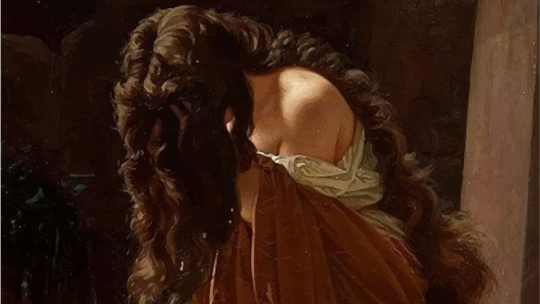

𝖜𝖍𝖎𝖙𝖊 𝖗𝖔𝖘𝖊𝖘 / waɪt ˈrəʊzɪz / ━━━ used to symbolize remembrance, love, and respect for the departed person, and a way of telling others that the departed has gone to heaven (Thursd).

A warmth burbled inside the hearth as swirled streams of flame billowed in gusts to then melt. Beams of amber shined against dusty glass frames splayed on a mantle, immortalized faces incandesced in the flickering shimmers of light. An older couple stood out against paled snow, hands resting against the shoulders of their budding son, whose eyes bore the most piercing of hues. Another sat beside it, captured from the same year. That same boy snuggled against the shoulder of another child as they both burrowed in the shade of a Linden tree, its branches unable to conceal the purity of their smiles as they relished in the company. Their frigid fingers intertwined as autumn turned to winter, heartened enough by each other's presence alone. Each photograph was a mere piece of a procumbent gallery; not an inch of the wooden surface remained uncovered as a story unfolded between each one.
However, a painting towered above them all.
Soft strokes blurred the resemblance of an anachronistic cathedral, walls sown with ancient tales of worship and devotion destined with promises of a life beyond living. But the centerpiece was them, a pair of blooming faces with those same intertwined fingers, eternally bound in the holiest of displays. Those piercing eyes, now delicate as the boy, who had grown into a man, looked upon his beloved with once-in-a-lifetime veneration.
The crackles of a record clicked into place as it spun endlessly on its track, humming a gentle melody into the comfortable ambiance, thawing the glacial remains of lonesome silence. (Name) nestled into their husband's office chair, fingers dancing across the worn surface of a letter. Fondness shone upon their face as they traced each smudged letter, allowing themself to be swallowed into leather. They flicked one of the papers with a resounding fwick, a glimmer in their eyes.
Nights ensnared in the confinements of a cell would only draw out yearning in the most desperate of men. But I will feel the touch of your enlightened hands in due time, моя милая. Like Joseph returned to Asenath, I will be home in time, as the Lord allows.
Со всей моей любовью и душой,
Федя
Yearning sighs escaped their lips, careful to place the letter back into an overstuffed box piled high with months of correspondence. They spread their hands against the arms of the chair, grasping onto the ledges as if holding onto another, head tilted back as tired eyes fluttered shut with a harmonical whistle in their throat, only to be interrupted by muffled knocks resonating from the front door.
The sequence was familiar — precise but shaken. Their eyes widened, breaking from the web of warmth as they rose from the chair. It was one of his subordinates; it had to be. Their feet pounded against rickety floorboards, the inanimate house bustling with life as they scrambled to mend their appearance. A heart pounded into the open air, swinging the door open, only to be met with the stars that forever drifted in the sky.
So gentle they were. So peaceful.
But it was not a person that they expected, instead immediately looking toward their feet with a knowing huff. And there it was, lying limp on the doormat — a bouquet of flowers.
These were unusual flowers, not unknown, but not the typical crimson salvias or milky corianders that usually arrived with each delivery. A frown deepened the insomnolent contour rooted in their eyelids as they bore their gaze into the menagerie of mismatched petals, enflamed anticipation glaciating into cool desolation. They lifted the bundle with utmost care, breeze twirling the ringlets of their hair as a forlorn omen. The door rocked back and forth as the wind went unnoticed, skin prickled as the heat of summer skies frosted over as they walked further into the house's silhouette.
Each flower was carefully plucked from its companions and spread in lonesome piles on the cold kitchen counter. Vibrant lilac shades of heliotropes blossomed, mementos of Tyrian eyes frozen in eternal devotion, softened only at their touch.
Paper scratched the soft skin of their palms, hands quick to toss out imperfections that sunk to the bottom of the wrap. One took a brilliant aquilegia, twirling it in their finger as violet speckles flaked into the air with each twist. The last they had seen these flowers was the eve of their engagement. Whispers of their resolute, intertwined paths were loosened from tight lips by a wine that had pried apart their own so intimately.
The blade of a knife sliced through solid air, a resonant haze efflorescent with each cut. They did not care to flinch as it slivered through their skin, silent as they beheld the vermillion that splattered the stem of a weeping hyacinth. These burdensome flowers danced in the eyes of Moscow passersby's sorrow, lining the trail toward an isolated mortuary rooted into the hill that overlooked their childhood home.
Each was placed carefully into a stiffened vase, crossed to shape a flawless display of rich purples and pinks. But even in the midst of such vibrancy, such life, one flower peeked underneath the rest, ghostly white petals acting as the centerpiece to this puzzle.
White roses.
Only once had they seen these flowers, often turned away with a constricted heart whenever their eyes merely glanced upon those petals. That same older couple, their faces immortalized not in bushels of homely flame but instead spectral through the flickers of a vigil. Those piercing eyes, the same that dared to carve into their very being, dulled in the gloom of despair, creased as sleep evaded the body and spirited abandoned the soul.
Perhaps it was for that reason he knew to prepare flowers; that no words could relieve the aching years bound to follow.
They loured upon the embodiment of their destination, life washed out by the emptiness that stood before them. Goosebumps scattered across the skin, an unforgiving frost rooted in place as their fingers twitched against wood. Then, the monotony snapped, the wound pulsing with pain as their body careened. Their eyes drifted from those retched flowers, falling upon a chair — his chair.
And they knew.
None would sit there. Not ever. The seat would remain forever occupied by the smoke of a spark snuffed out eternally, erased in only a few short moments of recollection. Cruel. The mind is but an uncaring machine, able to reach thoughts no human could bear.
And they trembled in the consequences of thought, far too conscious to move. Nails carved irate indentions into the table as knees buckled beneath them, body collapsing onto the cold wooden floor as deafened sobs excavated from their lungs. They clawed at their throat, unable to breathe as ignorance escaped them, paralyzed as if the reaper himself had mercifully struck his scythe down upon them.
A presence watched from beyond a now motionless door, snow-white tresses that shone against beams of moonlight, a man wincing at the guttural, broken screams of an empty heart that echoed from inside. The house was far too still now, far too large for only one soul to occupy. Unable to bear another moment of torment, he scraped the dirt from his uncovered palms, neglecting the tears that stained his cheeks as he fled from the home, now only a mausoleum of memories sitting within a field of grieving stars.

моя милая = my darling
со всей моей любовью и душой = with all my love and soul
федя = fedya
ᴛᴀɢʟɪꜱᴛ: @imhandicapableofmath @seisitive @solandiss @ruru-kiss @ishqani @zyilas
© ɢᴜᴀᴄᴍᴏʟᴇʀᴏʟʟ 2023 — ᴅᴏ ɴᴏᴛ ᴄᴏᴘʏ ᴏʀ ʀᴇᴘᴏꜱᴛ ᴍʏ ᴡᴏʀᴋꜱ ꜰᴏʀ ᴀɴʏ ʀᴇᴀꜱᴏɴ. ʜᴏᴡᴇᴠᴇʀ, ʀᴇʙʟᴏɢꜱ ᴀʀᴇ ʙᴏᴛʜ ᴡᴇʟᴄᴏᴍᴇᴅ ᴀɴᴅ ᴇɴᴄᴏᴜʀᴀɢᴇᴅ
#muse's anthology ‧₊˚ ⋅#starring: fedya .ೃ࿐#gn!reader#bsd#bungou stray dogs#bungo stray dogs#bsd x reader#bungou stray dogs x reader#bungo stray dogs x reader#bsd s5 ep11#bsd s5 spoilers#fyodor dostoevsky#fyodor bsd#fyodor dostoevsky x reader#fyodor x reader
145 notes
·
View notes